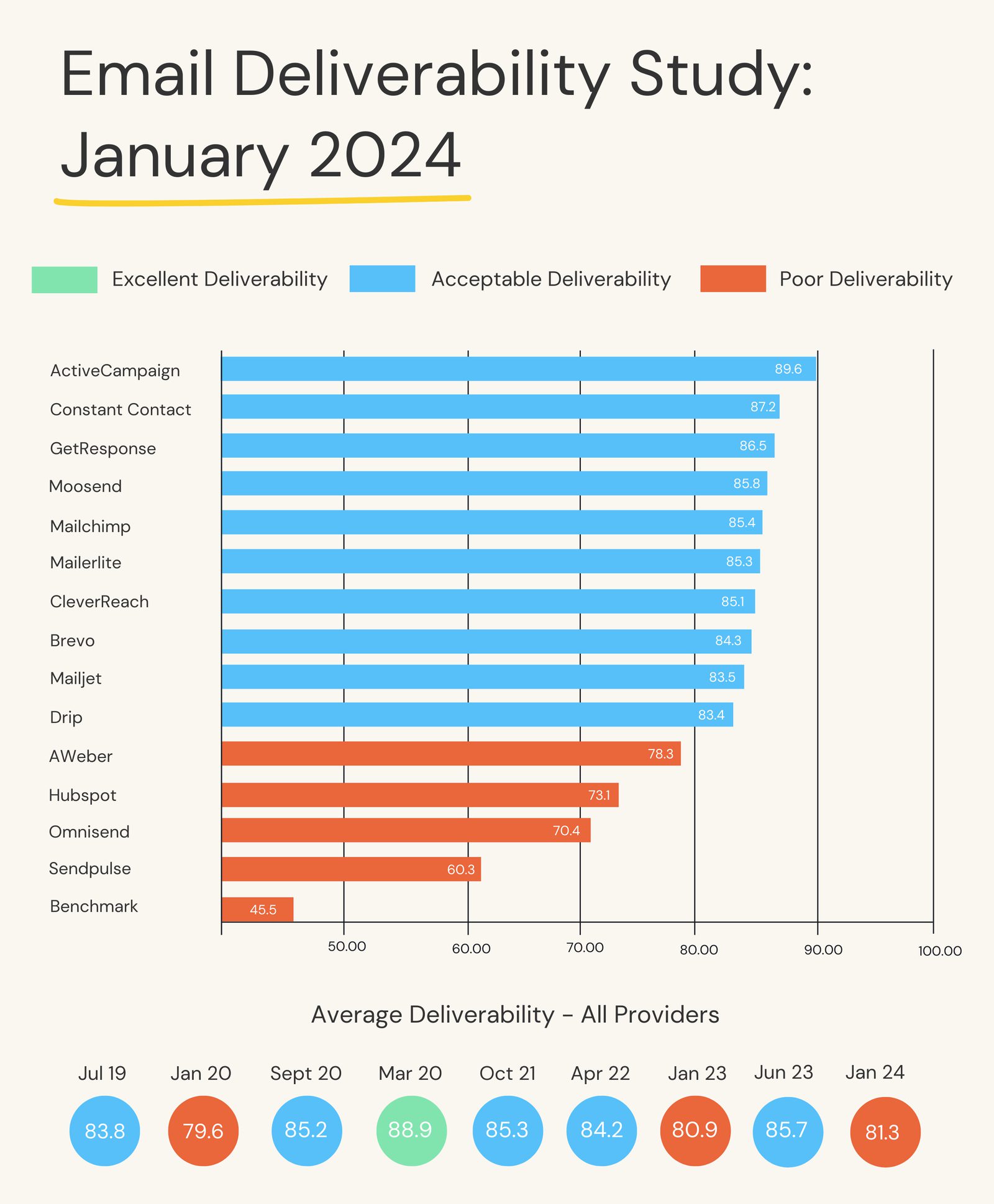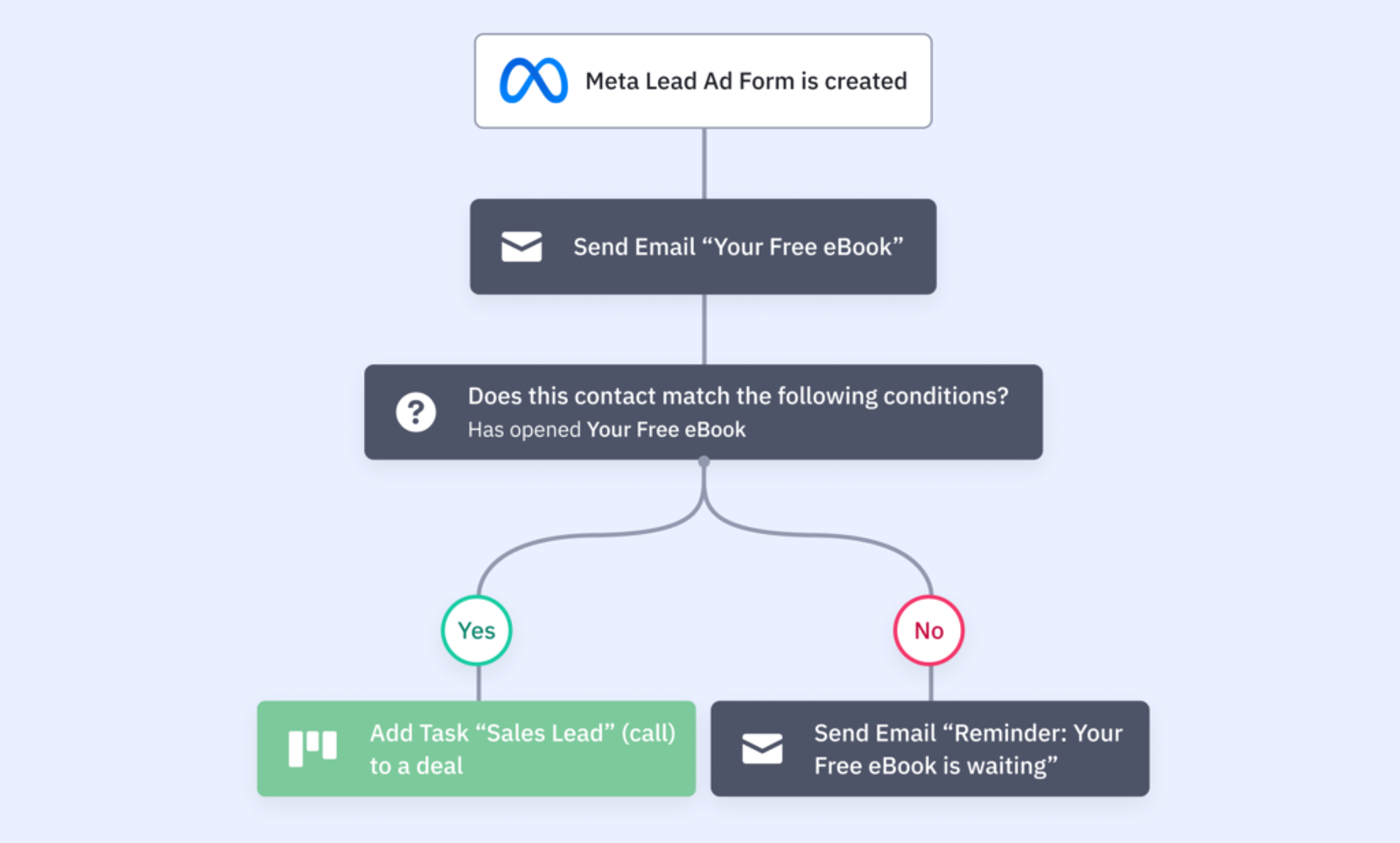While HubSpot is recognized as a leading marketing automation platform, there are alternative solutions that may better suit your business needs. While HubSpot offers comprehensive features and an intuitive interface, these competitor alternatives provide specific advantages in different areas.
Here are five HubSpot alternatives to consider, each catering to specific topics:
- ActiveCampaign - Best for advanced email marketing automation
- Marketo - Best for enterprise-level marketing automation and lead management
- Pardot by Salesforce - Best for B2B marketers looking for robust lead nurturing and Salesforce integration
- Mailchimp - Best for small businesses and startups
- ConvertKit - Best for content creators and bloggers
ActiveCampaign — Best for advanced email marketing automation
ActiveCampaign is a powerful email marketing automation platform that is a compelling alternative to HubSpot, particularly for advanced email marketing automation.
Here are the core strengths of ActiveCampaign and why it excels in this area:
Best feature: ActiveCampaign’s advanced automation capabilities stand out with its robust automation features that allow businesses to create highly personalized and targeted email campaigns. Its visual automation builder makes it easy to design complex automation workflows based on various triggers, conditions, and actions. ActiveCampaign provides the tools to engage customers at every stage of their journey, from automated email sequences to dynamic content personalization.
Pros:
- Comprehensive segmentation: ActiveCampaign offers advanced segmentation options to divide your audience into specific groups based on their behavior, interests, demographics, and more. This allows for highly targeted and relevant email campaigns.
- Dynamic email content: With ActiveCampaign, you can customize email content dynamically based on individual subscriber data, resulting in more personalized and impactful communication.
- CRM integration: ActiveCampaign integrates seamlessly with popular CRM systems, enabling you to unify your marketing and sales efforts and gain a holistic view of your customers. ActiveCampaign also offers its own CRM that works seamlessly with its marketing automation software.
- Best-in-class email deliverability: ActiveCampaign is #1 in email deliverability among competitors in Emailtooltester’s 2024 deliverability test, with an average deliverability rate of 89.6%

If your emails aren’t landing in inboxes, your marketing efforts are going to waste. Choose a platform with solid deliverability.
Cons:
- Learning Curve: Due to its rich feature set, ActiveCampaign may have a steeper learning curve for beginners compared to simpler email marketing tools.
- Limited Landing Page Builder: While ActiveCampaign provides basic landing page functionality, it may not offer as extensive a range of customization options as specialized landing page builders.
Entry price: ActiveCampaign offers pricing plans starting from a $29 per month entry-level price, making it accessible for businesses of various sizes and budgets.
Free trial: Yes, ActiveCampaign offers a free trial period, allowing users to explore and experience its features before committing.

Here is a comparison table highlighting ActiveCampaign's strengths as an alternative for email marketing automation:
| ActiveCampaign | HubSpot | |
| Best Feature | Advanced automation capabilities | All-in-one marketing automation |
| Pros | Comprehensive segmentation | All-in-one marketing platform |
| Dynamic email content | Robust reporting and analytics | |
| CRM integration | Extensive integration ecosystem | |
| Cons | Learning curve | Higher learning curve |
| Limited landing page builder | Higher pricing | |
| Complex pricing structure | Less advanced automation | |
| Entry Price | Starting at $15/month Find pricing details here | Starts at $20 for a basic plan and up to 1,000 contacts |
| Free Trial | Yes | Yes |
Marketo — Best for enterprise-level marketing automation and lead management
Marketo is a powerful marketing automation platform that is an excellent alternative to HubSpot, especially for enterprise-level marketing automation and lead management. Here are the core strengths of Marketo and why it excels in this area:
Best feature: Marketo’s enterprise-level marketing automation offers extensive marketing automation capabilities designed for large-scale businesses. With its advanced workflow builder, you can create complex automation sequences and nurture leads throughout your buyer's journey. Marketo provides a wide range of automation features, including lead scoring, behavioral tracking, dynamic content, and personalized engagement.
Pros:
- Robust lead management: Marketo is renowned for its comprehensive lead management functionalities. It enables businesses to effectively capture, track, and nurture leads, ensuring seamless integration between marketing and sales teams.
- Advanced reporting and analytics: Marketo offers powerful reporting and analytics tools that provide in-depth insights into your marketing and sales performance. These analytics help you measure campaign effectiveness, track ROI, and optimize your strategies.
- Scalability and customization: As an enterprise-focused platform, Marketo is highly scalable and provides extensive customization options to meet the unique needs of large organizations.
Cons:
- Complexity: Marketo's rich feature set and customization options may present a steeper learning curve for new users. It requires a dedicated effort to leverage its capabilities fully.
- Cost: Compared to other marketing automation tools, Marketo's pricing can be higher, making it more suitable for larger enterprises with the resources to invest in a comprehensive marketing solution.
- Implementation time: Implementing and configuring Marketo to align with your specific business processes may require more time and technical expertise.
Entry price: Marketo's pricing structure is tailored to enterprise-level businesses, and the entry-level price reflects its target market.
Free trial: No, Marketo does not offer a free trial. However, they provide demonstrations and consultations to help businesses evaluate the platform.
Here is a comparison table highlighting Marketo's strengths as an alternative for sales-focused CRM:
| Marketo | HubSpot | |
| Best Feature | Enterprise-level marketing automation | All-in-one marketing platform |
| Pros | Robust lead management | All-in-one marketing platform |
| Advanced reporting and analytics | Robust reporting and analytics | |
| Scalability and customization | Extensive integration ecosystem | |
| Cons | Complexity | Higher learning curve |
| Cost | Higher pricing | |
| Implementation time | Less advanced automation | |
| Entry Price | Tailored to individual businesses | Starts at $20 for a basic plan and up to 1,000 contacts |
| Free Trial | No | Yes |
Pardot by Salesforce — Best for B2B marketers looking for lead nurturing
Pardot is an excellent alternative to HubSpot, particularly for B2B marketers seeking robust lead nurturing and seamless Salesforce integration, all while being mindful of a tight budget. Here are the core strengths of Pardot and why it stands out as a cost-effective solution:
Best feature: Pardot’s Robust Lead Nurturing and Salesforce Integration offers comprehensive lead nurturing capabilities, allowing B2B marketers to engage with prospects at every stage of the buyer's journey. Its automation features enable targeted and personalized communication, ensuring relevant content delivery to drive conversions. Additionally, Pardot seamlessly integrates with Salesforce, enabling smooth data synchronization between marketing and sales teams.
Pros:
- Salesforce integration: Pardot's native integration with Salesforce ensures a seamless flow of data, making it an ideal choice for businesses already using Salesforce CRM. This integration facilitates efficient lead management and enhances collaboration between marketing and sales departments.
- Advanced lead scoring: Pardot provides robust lead scoring capabilities, allowing marketers to identify and prioritize high-quality leads based on predefined criteria. This helps sales teams focus on leads most likely to convert, optimizing their efforts and improving overall efficiency.
- Engaging email marketing: With Pardot, you can create visually appealing and engaging email campaigns, leveraging dynamic content and personalization to deliver tailored messages to your prospects. Its advanced email analytics enable you to measure campaign effectiveness and make data-driven decisions.
Cons:
- Learning curve: Like any robust marketing automation tool, Pardot may have a steeper learning curve, especially for users unfamiliar with marketing automation concepts and the Salesforce ecosystem.
- Limited native CRM functionality: While Pardot integrates seamlessly with Salesforce CRM, it may have more limited native CRM features than HubSpot, which offers an all-in-one marketing and sales platform.
- Pricing tiers: Pardot's pricing is structured to cater primarily to mid-sized and enterprise-level businesses. Smaller businesses with tight budgets may find the entry-level pricing less accessible.
Entry price: Pardot's entry-level pricing, $1,250 per month, is designed for mid-sized businesses and may not be as budget-friendly for smaller organizations.
Free trial: No, Pardot does not offer a free trial. However, they provide product demonstrations and consultations to help businesses evaluate the platform.
Here is a comparison table highlighting Pardot's strengths as an alternative for sales-focused CRM:
| Pardot | HubSpot | |
| Best Feature | Robust lead nurturing and salesforce integration | All-in-one marketing platform |
| Pros | Seamless salesforce integration | All-in-one marketing platform |
| Advanced lead scoring | Robust Reporting and analytics | |
| Engaging email marketing | Extensive integration ecosystem | |
| Cons | Learning curve | Higher learning curve |
| Limited native CRM functionality | Higher pricing | |
| Pricing tiers | Less advanced automation | |
| Entry Price | $1,250 per month for up to 10,000 contacts | Starts at $20 for a basic plan and up to 1,000 contacts |
| Free Trial | No | Yes |
Mailchimp — Best for small businesses and startups
Mailchimp is a compelling alternative to HubSpot, particularly for small businesses and startups needing user-friendly email marketing and automation tools at an enterprise level. Here are the core strengths of Mailchimp and why it excels as an enterprise marketing automation solution:
Best feature: Mailchimp’s user-friendly email marketing and automation tools offer an intuitive and user-friendly interface, making it easy for businesses to create and automate email marketing campaigns. With drag-and-drop functionality, customizable templates, and automation workflows, users can quickly set up targeted email campaigns to engage with their audience effectively.
Pros:
- Extensive integration ecosystem: Mailchimp integrates with various third-party applications and platforms, enabling businesses to connect their marketing efforts with other tools, such as e-commerce platforms, CRM systems, and social media platforms.
- Advanced segmentation and personalization: Mailchimp provides robust segmentation capabilities, allowing businesses to target specific audience segments with personalized content. This helps improve engagement, conversions, and overall campaign effectiveness.
- Scalability: While Mailchimp is well-suited for small businesses and startups, it also offers scalable features that can accommodate the growing needs of an enterprise. Mailchimp provides advanced automation, analytics, and reporting capabilities as businesses expand.
Cons:
- Limited CRM functionality: Compared to HubSpot's all-in-one platform, Mailchimp's CRM capabilities are more limited. It primarily focuses on email marketing and automation, so businesses looking for a comprehensive CRM solution may need to integrate Mailchimp with a separate CRM system.
- Learning curve for advanced features: While Mailchimp is known for its user-friendly interface, mastering more advanced features and functionalities may require learning and experimentation.
- Pricing tiers: As businesses grow and require more advanced features, the pricing tiers of Mailchimp may become more expensive compared to other platforms offering similar functionalities.
Entry price: Mailchimp offers different pricing tiers to accommodate the needs and scale of different businesses, including a free plan and a premium enterprise-level plan.
Free trial: Yes, Mailchimp offers a free trial for businesses to explore its features and determine its suitability for their marketing automation needs.
Here is a comparison table highlighting Mailchimp's strengths as an alternative for enterprise marketing automation:
| Mailchimp | HubSpot | |
| Best Feature | User-friendly email marketing and automation tools | All-in-one marketing Platform |
| Pros | Extensive integration ecosystem | All-in-one marketing Platform |
| Advanced segmentation and personalization | Robust reporting and analytics | |
| Scalability | Extensive integration ecosystem | |
| Cons | Limited CRM functionality | Higher learning curve |
| Learning curve for advanced features | Higher pricing | |
| Pricing tiers | Less advanced automation | |
| Entry Price | Free forever plan for up to 1,000 monthly email sends and 500 contacts. Their Essentials plan is $26.50 per month for up to 1,500 contacts | Starts at $20 for a basic plan and up to 1,000 contacts |
| Free Trial | Yes | Yes |
ConvertKit — Best for content creators and bloggers
ConvertKit is an excellent alternative to HubSpot for businesses needing a comprehensive CRM solution. Here are the core strengths of ConvertKit and why it excels as a comprehensive CRM platform:
Best feature: ConvertKit specializes in providing seamless email marketing and subscriber management features. With its user-friendly interface and powerful automation capabilities, businesses can easily create targeted email campaigns, segment their audience, and track engagement to nurture leads effectively.
Pros:
- Subscriber-centric approach: ConvertKit places a strong emphasis on understanding and catering to the needs of individual subscribers. It offers advanced tagging and segmentation features, allowing businesses to create highly personalized content tailored to their audience's preferences and behaviors.
- Customizable opt-in forms and landing pages: ConvertKit provides customizable opt-in forms and landing pages that are easy to create and integrate into websites. This helps businesses capture leads and grow their subscriber base efficiently.
- Focus on content creators and bloggers: ConvertKit is specifically designed for content creators and bloggers, offering features like RSS feed integration, content upgrades, and automated content sequences. It provides tools to build and engage with an audience, making it an ideal choice for businesses focused on content marketing.
Cons:
- Less robust sales and marketing automation: Compared to HubSpot's all-in-one platform, ConvertKit's automation capabilities may be more limited, particularly in sales automation and advanced marketing workflows.
- Limited third-party integrations: While ConvertKit integrates with popular platforms and tools, its integration options may be more limited than HubSpot, which has a broader range of integrations with various third-party applications.
- Pricing tiers and scalability: ConvertKit's pricing is based on the number of subscribers, and as businesses grow and their subscriber base expands, the pricing may become more expensive compared to other CRM alternatives.
Entry price: ConvertKit offers different pricing tiers based on the number of subscribers, making it suitable for businesses of various sizes and budgets. Their free plan is great for getting started with up to 300 contacts, while their Creator plan is just $9 per month for up to 300 contacts.
Free trial: Yes, ConvertKit offers a free trial for businesses to explore its features and determine its suitability for their comprehensive CRM needs.
Here is a comparison table highlighting ConvertKit's strengths as an alternative for comprehensive CRM:
| ConvertKit | HubSpot | |
| Best Feature | Seamless email marketing and subscriber management | All-in-one marketing platform |
| Pros | Subscriber-centric approach | All-in-one marketing platform |
| Customizable opt-in forms and landing pages | Robust reporting and analytics | |
| Focus on content creators and bloggers | Extensive integration ecosystem | |
| Cons | Less robust sales and marketing automation | Higher learning curve |
| Limited third-party integrations | Higher pricing | |
| Pricing tiers and scalability | Less advanced automation | |
| Entry Price | Free forever plan for up to 300 contacts and $9 a month for their Creator plan and 300 contacts. For 1,000 contacts, plans start at $25 per month | Starts at $20 for a basic plan and up to 1,000 contacts |
| Free Trial | Yes | Yes |







